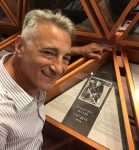Jeff Buller at the induction ceremony for his father, the late Hy Buller, into the International Jewish Sports Hall of Fame in Netanya, Israel. (photo by Diane Buller)
These remarks were delivered on July 4 as part of the International Jewish Sports Hall of Fame induction ceremony at the Wingate Institute, in Netanya, Israel, for my late uncle, Hy Buller, who played for the New York Rangers hockey team from 1950 to 1954.
Ihave a photo hanging in my office of a curious little boy playing outdoors – a photo of me at 3 years old. In this photo, I’m proudly wearing a New York Rangers cardigan sweater, a loving gift from my Uncle Hy.
My Uncle Hy died in 1968, when I was still a teenager and, for much of my youth, he and his family lived in Cleveland, far from my hometown of Vancouver. I really got to know him best while penning an article about him for The Scribe, the journal of the Jewish Museum and Archives of British Columbia. This article, aptly titled “A mensch on defence,” was published in 2002.
In writing “A mensch on defence,” I reconnected with Hy’s three sons, Bob, Bruce and Jeff, who provided valuable information about their father. My cousins also put me in touch with legendary hockey players who had shared the ice with Hy: “Mr. Hockey” Gordie Howe, “Terrible” Ted Lindsay and goalie Johnny Bower. Each had warm memories of Hy and spoke highly of his abilities.
Winters in Saskatoon were devoted to hockey. Like many boys his age, Hy spent most of his time outside of school hours vying to be king of the ice on his uncle’s vacant lot, flooded and frozen each year.
A natural athlete, Hy quickly rose up the ranks and caught the eye of local coaches and scouts. When it was too warm for hockey, Hy never stopped moving, and was active year-round in football, baseball, basketball, golf, swimming and track and field, earning many awards.
In the 1940s and 1950s, there were only six teams in the National Hockey League. Most of the players on these teams came from the Canadian Prairies, with the majority coming from the small towns of Saskatchewan. From the time they were old enough to hold a hockey stick, youngsters in these hinterlands developed a fierce love for the game and a burning desire to be one of the 120 favoured players that made up the six NHL teams.
After an illustrious eight-year stint in the American Hockey League, Hy was traded to the New York Rangers at the close of the 1950-51 season, where he played with distinction until retirement in 1954.
A newspaper commented that, in street clothes, Hy Buller, with his mild, scholarly appearance, glasses and receding hairline, looked like someone who spent a lot of time in a library and knew from which end to read a book. But, once on ice with a hockey stick in his hand, something happened to Hy – a kind of Clark Kent into Superman transformation in which he changed from a studious-appearing bookworm to a formidable, hard-checking defenceman who seemed to be everywhere at once. He was admired not only for his solid plays but also for his good sportsmanship.
Hy’s type of playing in many respects resembled the kind of hockey played in Europe, depending more on clever stick-handling and skating than on the rough-and-tumble brand played in North America. His style and ability earned him the admiration of his fellow players.
I’m honoured to be accepting this award on behalf of my uncle and my family, 23 of whom have traveled from far and wide to share in this special moment. It’s a tribute to how well loved and respected he was that so many have journeyed to be here. I’d specifically like to note Hy’s sons Jeff and Bob, who have come with their wives, Diane and Sandie, and children.
On behalf of the family, I’m pleased to express our gratitude to the International Jewish Sports Hall of Fame for their induction of Hy Buller. My sincerest thanks.
To read David Schwartz’s 2002 article “A mensch on defence,” visit jewishmuseum.ca/publication/scribe-volume-22-mensch-defense. For more information on Hy Buller, visit en.wikipedia.org/wiki/hy_buller.

